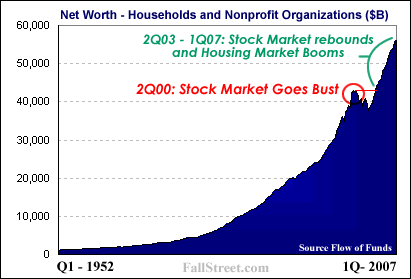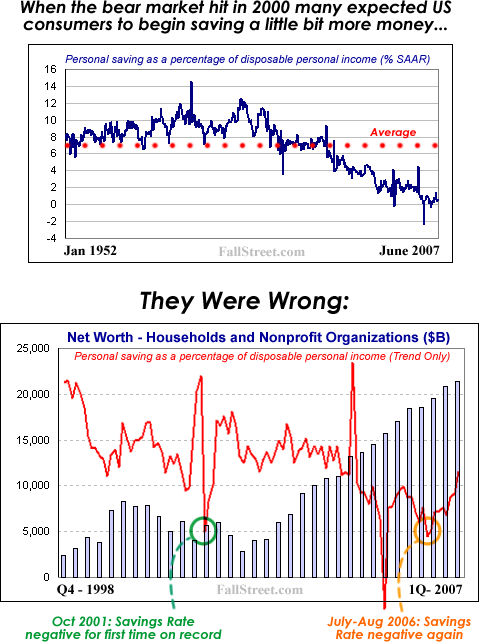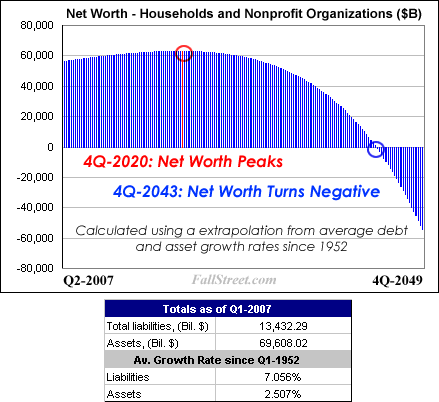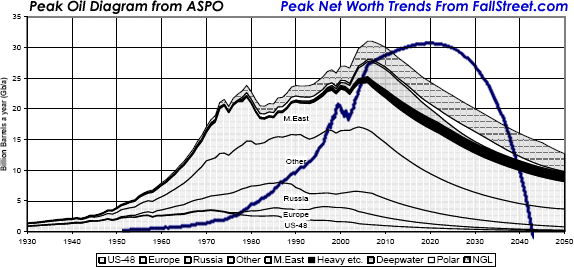Forget Peak Oil, Peak Net Worth is the Real Danger!
Stock-Markets / Deflation Aug 21, 2007 - 02:56 PM GMTBy: Brady_Willett
Is the proverbial 'Peak' in Consumer Borrowing upon us?
With the 1990s stock market mania about to go bust, it was easy to conclude that the U.S. economy would see an entrenched recession. After all, the bubble was arguably larger than any before, and - thanks to easy investing via the internet and the proliferation of 401Ks, mutual funds, etc. - the fallout in stock prices was going to impact an unprecedented proportion of the population directly.
But as stocks started to go bust in 2000 something unexpected happened: the housing market went boom.

That the boom in the US housing market played a key role in stabilizing a 14-quarter flat period in household net worth (2Q00-2Q03) is without question. Yet as remarkable as the recession induced U.S. housing boom was , more remarkable still is the fact that the US consumer traversed this tumultuous period seemingly unscathed. To be sure, before during and after the stock market crash, the 2001 recession, and 9/11, the US consumer defied the odds and continued spending a lot while saving very little.

The reason the 'net worth' data is an important consideration today is self evident: unable to explain why the outlook for consumer spending is positive given that debt service costs are hitting record highs, savings are near record lows, and wages are failing to keep pace with inflation, optimistic economists point to the consumer's balance sheet and calmly conclude that everything will be all right. And although these analysts have indeed been right for a long time (16-years and counting), there is ample evidence brewing to suggest that the US consumer is about to fall down. For example, declining housing prices have closed the housing ATMs for many, last month's larger than expected increase in consumer credit was the result of credit card borrowing, and retailers are already starting to warn of tougher times.
As for the headline net worth figure that serves to assuage economist's forecasts, even if one assumes that the fallout in the housing market can be contained via a commensurate increase in say equity wealth, the ominous trend of liability growth outpacing asset growth is difficult to ignore. Seemingly counterintuitive - if debt growth is really that ominous why does household net worth continue to increase? - basic math suggests that debt growth is nearing the point of being dangerous.

What can be added to the basic math theme is the correlation between long-term U.S. interest rates and asset prices. Without straying from our focus, the story here is of a precipitous long-term decline in U.S. interest rates which, in part, has fueled outsized appreciation in equities and homes. Given that real adjusted return for these assets could disappoint when compared to the spectacular returns logged in the last 25-years, it makes it that much more challenging to avoid a day of reckoning soon on present net worth trends alone.
Long ignored as overly pessimistic, bears have come out of hibernation in recent weeks proclaiming that the day of reckoning is here. And while most bears do not specifically focus on long-term net worth trends, the complex interplay between asset appreciation and household debt coverage is generally implied in any pessimistic manifesto. Quite frankly, 'Can the U.S. consumer keep spending?' is a question that deserves to be asked repeatedly so long as trends suggest that consumer spending is grounded upon unstable moorings.
Whether another peak in net worth is here or near, it should be remembered that the first consumer led recession in more than 16-years is not likely to be as painless as the previous recession. If the current trends in debt growth persist it is not a question of if, but when...
In short, while much of the press has been focused on the threat of peak oil to the U.S. economy, the more immediate danger lies in the liquidation of household wealth through the accumulation of debt.

By Brady Willett and Todd Alway
FallStreet.com
FallStreet.com was launched in January of 2000 with the mandate of providing an alternative opinion on the U.S. equity markets. In the context of an uncritical herd euphoria that characterizes the mainstream media, Fallstreet strives to provide investors with the information they need to make informed investment decisions. To that end, we provide a clearinghouse for bearish and value-oriented investment information, independent research, and an investment newsletter containing specific company selections.
Brady Willett Archive |
© 2005-2022 http://www.MarketOracle.co.uk - The Market Oracle is a FREE Daily Financial Markets Analysis & Forecasting online publication.




